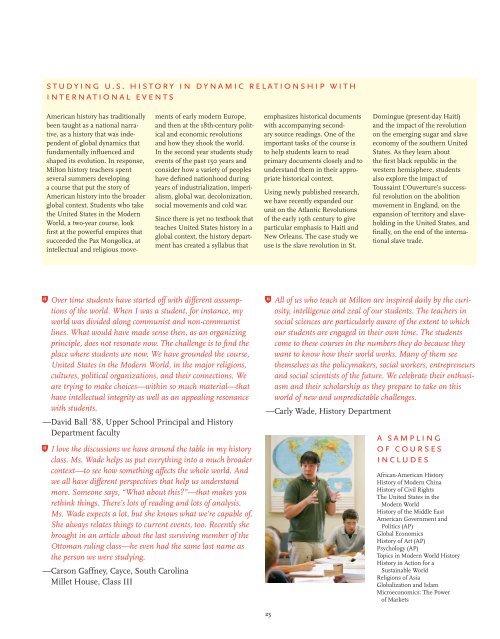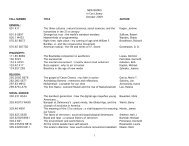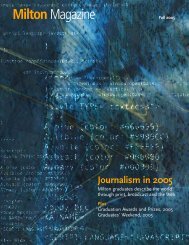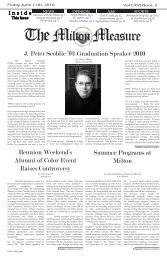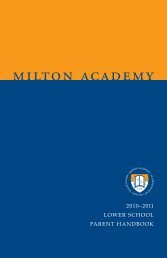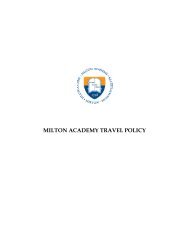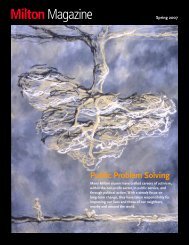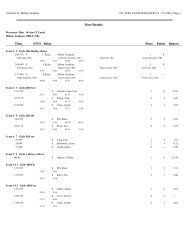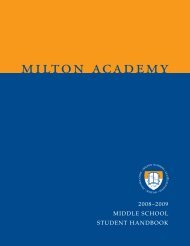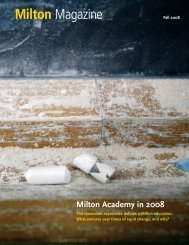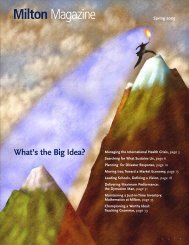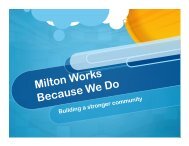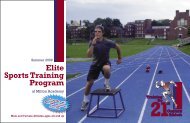Contents - Milton Academy
Contents - Milton Academy
Contents - Milton Academy
- No tags were found...
You also want an ePaper? Increase the reach of your titles
YUMPU automatically turns print PDFs into web optimized ePapers that Google loves.
studying u.s. history in dynamic relationship withinternational eventsAmerican history has traditionallybeen taught as a national narrative,as a history that was independentof global dynamics thatfundamentally influenced andshaped its evolution. In response,<strong>Milton</strong> history teachers spentseveral summers developinga course that put the story ofAmerican history into the broaderglobal context. Students who takethe United States in the ModernWorld, a two-year course, lookfirst at the powerful empires thatsucceeded the Pax Mongolica, atintellectual and religious movementsof early modern Europe,and then at the 18th-century politicaland economic revolutionsand how they shook the world.In the second year students studyevents of the past 150 years andconsider how a variety of peopleshave defined nationhood duringyears of industrialization, imperialism,global war, decolonization,social movements and cold war.Since there is yet no textbook thatteaches United States history in aglobal context, the history departmenthas created a syllabus thatemphasizes historical documentswith accompanying secondarysource readings. One of theimportant tasks of the course isto help students learn to readprimary documents closely and tounderstand them in their appropriatehistorical context.Using newly published research,we have recently expanded ourunit on the Atlantic Revolutionsof the early 19th century to giveparticular emphasis to Haiti andNew Orleans. The case study weuse is the slave revolution in St.Domingue (present-day Haiti)and the impact of the revolutionon the emerging sugar and slaveeconomy of the southern UnitedStates. As they learn aboutthe first black republic in thewestern hemisphere, studentsalso explore the impact ofToussaint L’Ouverture’s successfulrevolution on the abolitionmovement in England, on theexpansion of territory and slaveholdingin the United States, andfinally, on the end of the internationalslave trade.Over time students have started off with different assumptionsof the world. When I was a student, for instance, myworld was divided along communist and non-communistlines. What would have made sense then, as an organizingprinciple, does not resonate now. The challenge is to find theplace where students are now. We have grounded the course,United States in the Modern World, in the major religions,cultures, political organizations, and their connections. Weare trying to make choices—within so much material—thathave intellectual integrity as well as an appealing resonancewith students.— David Ball ’88, Upper School Principal and HistoryDepartment facultyI love the discussions we have around the table in my historyclass. Ms. Wade helps us put everything into a much broadercontext—to see how something affects the whole world. Andwe all have different perspectives that help us understandmore. Someone says, “What about this?”—that makes yourethink things. There’s lots of reading and lots of analysis.Ms. Wade expects a lot, but she knows what we’re capable of.She always relates things to current events, too. Recently shebrought in an article about the last surviving member of theOttoman ruling class—he even had the same last name asthe person we were studying.— Carson Gaffney, Cayce, South CarolinaMillet House, Class IIIAll of us who teach at <strong>Milton</strong> are inspired daily by the curiosity,intelligence and zeal of our students. The teachers insocial sciences are particularly aware of the extent to whichour students are engaged in their own time. The studentscome to these courses in the numbers they do because theywant to know how their world works. Many of them seethemselves as the policymakers, social workers, entrepreneursand social scientists of the future. We celebrate their enthusiasmand their scholarship as they prepare to take on thisworld of new and unpredictable challenges.—Carly Wade, History Departmenta samplingof coursesincludesAfrican-American HistoryHistory of Modern ChinaHistory of Civil RightsThe United States in theModern WorldHistory of the Middle EastAmerican Government andPolitics (AP)Global EconomicsHistory of Art (AP)Psychology (AP)Topics in Modern World HistoryHistory in Action for aSustainable WorldReligions of AsiaGlobalization and IslamMicroeconomics: The Powerof Markets25


